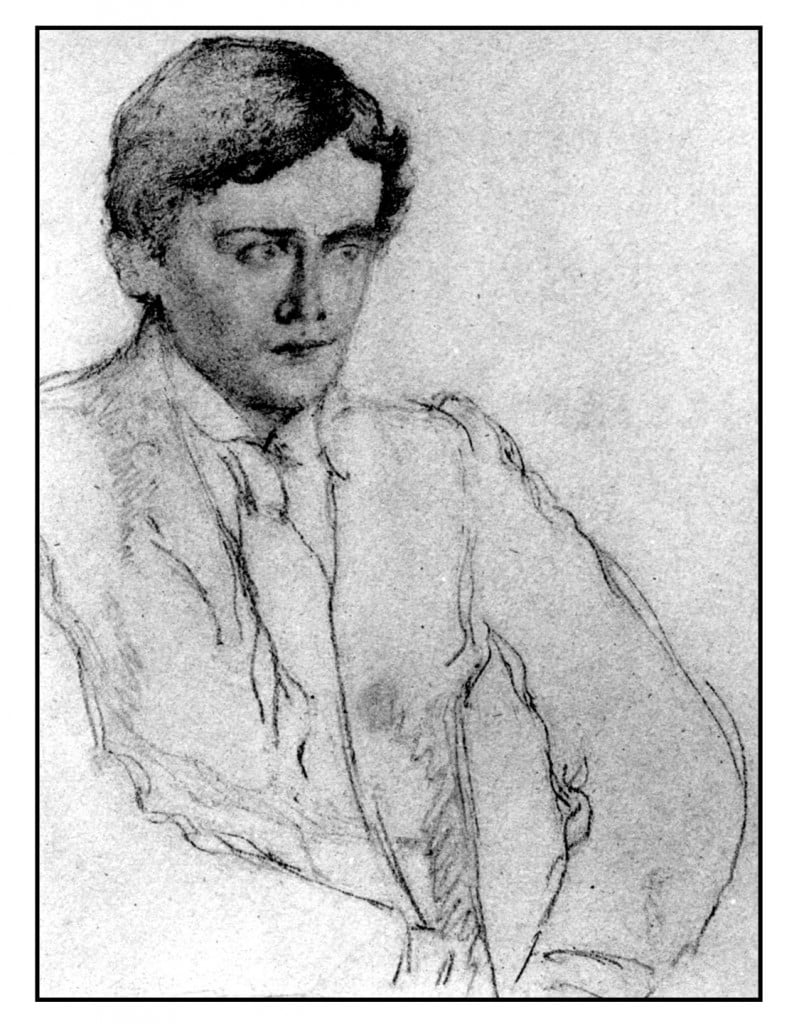Sketch by William Rothenstein, ca. 1891.
Poems of Ernest Dowson; With a Memoir by Arthur Symons,
Four Illustrations by Aubrey Beardsley and a Portrait by William Rothenstein
Arthur Symons:
I cannot remember my first meeting with Ernest Dowson. It may have been in 1891, at one of the meetings of the Rhymers' Club, in an upper room of the "Cheshire Cheese," where long clay pipes lay in slim heaps on the wooden tables, between tankards of ale; and young poets, then very young, recited their own verses to one another with a desperate and ineffectual attempt to get into key with the Latin Quarter. Though few of us were, as a matter of fact, Anglo-Saxon, we could not help feeling that we were in London, and the atmosphere of London is not the atmosphere of movements or of societies. In Paris it is the most natural thing in the world to meet and discuss literature, ideas, one's own and one another's work; and it can be done without pretentiousness or constraint, because, to the Latin mind, art, ideas, one's work and the work of one's friends, are definite and important things, which it would never occur to any one to take anything but seriously. In England art has to be protected not only against the world, but against one's self and one's fellow artist, by a kind of affected modesty which is the Englishman's natural pose, half pride and half self-distrust. So this brave venture of the Rhymers' Club, though it lasted for two or three years, and produced two little books of verse which will some day be literary curiosities, was not quite a satisfactory kind of cénacle. Dowson, who enjoyed the real thing so much in Paris, did not, I think, go very often; but his contributions to the first book of the club were at once the most delicate and the most distinguished poems which it contained. Was it, after all, at one of these meetings that I first saw him, or was it, perhaps, at another haunt of some of us at that time, a semi-literary tavern near Leicester Square, chosen for its convenient position between two stage-doors? It was at the time when one or two of us sincerely worshipped the ballet; Dowson, alas! never. I could never get him to see that charm in harmonious and coloured movement, like bright shadows seen through the floating gauze of the music, which held me night after night at the two theatres which alone seemed to me to give an amusing colour to one's dreams. Neither the stage nor the stage-door had any attraction for him; but he came to the tavern because it was a tavern, and because he could meet his friends there. Even before that time I have a vague impression of having met him, I forget where, certainly at night; and of having been struck, even then, by a look and manner of pathetic charm, a sort of Keats-like face, the face of a demoralised Keats, and by something curious in the contrast of a manner exquisitely refined, with an appearance generally somewhat dilapidated. That impression was only accentuated later on, when I came to know him, and the manner of his life, much more intimately.
